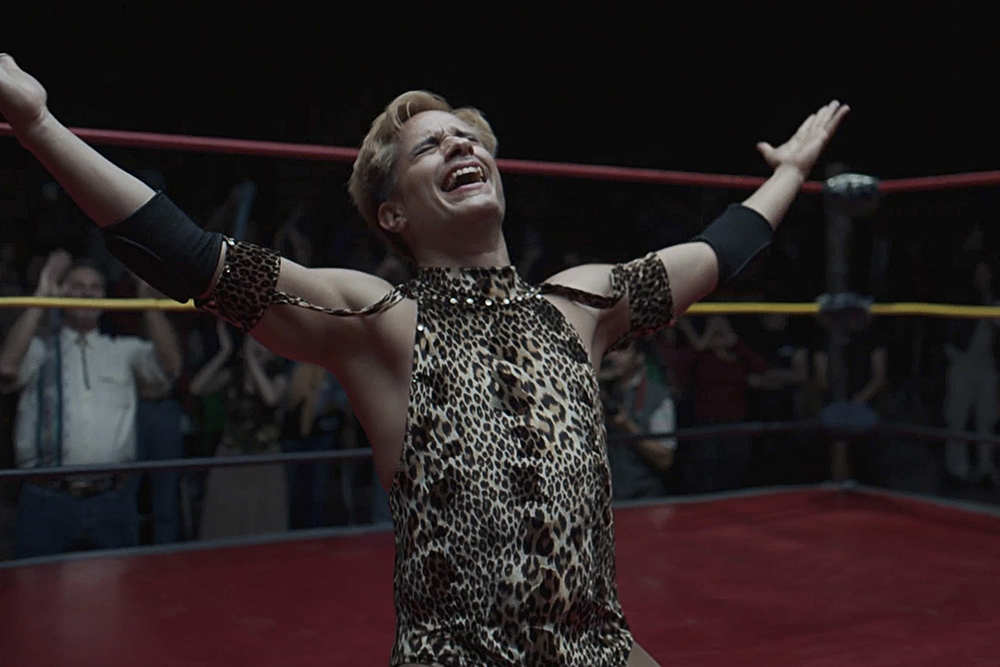Gael García Bernal is excellent in documentarian Roger Ross Williams’ “Cassandro,” as he embodies the two distinct sides (both on and off the ring) of the titular “Liberace of Lucha Libre.” Unfortunately, the rest of the film isn’t as good or polished as the leading performance due to the run-of-the-mill biopic structure and loss of direction in its latter half.
Professional wrestling is a powerhouse of televised entertainment. The sport might be an act fueled by pantomime performances and fake violence, but I would lie if I said I didn’t enjoy it. Like many, I grew up watching wrestling, and my mom did as well. When she was little, her father took her to see some ring matches, and she passed the love for the clothesline and suplexes onto me. From Shawn Michaels and The Undertaker to Jeff Hardy and Edge, I was fully invested in the chaotic storylines. I watched many of its grand pay-per-view events like “Wrestlemania,” “Elimination Chamber” (which was one of my favorites), and the classic thirty-man “Royal Rumble.” That’s one of the reasons why I ended up liking Darren Aronofksky’s Mickey Rourke-led “The Wrestler.” It portrayed the good and bad aspects of living (the eventual fracture as you age) as a famed wrestling star.
Gael García Bernal is Exceptionally Cast
There aren’t many films about wrestling or the lives on and off the ring of these people who sacrifice their bodies for our entertainment. So, when I heard that documentarian Roger Ross Williams (“The Apollo,” “Life,” “Animated, God Loves Uganda”) was making a film on the famed Mexican wrestler known as the “Liberace of Lucha Libre,” Saúl Armendáriz (better known by his stage name, Cassandro), I was pretty excited to see it. And that Gael García Bernal was leading the pact in the cast? I’m all in for it. He’s a fantastic actor that deserves everyone’s attention. Seeing him in such a different role like this would be fascinating. And it was! García Bernal is excellent in the film as he embodies the duality within the titular character. However, “Cassandro” ultimately falls into the run-of-the-mill biopic territory in its layout.
The wrestling scene in Juárez, Mexico, was big, but those who fought in the more minor matches never got their chance at the spotlight. Saúl (Gael García Bernal), a gay luchador, wants a change in his life because he’s tired of playing the nondescript character, El Topo. His character didn’t demand much attention or inspiration for the technique because he always lost his matches. Saúl wants to be a star, and quickly so. He starts searching for answers to get his start in the big leagues. His fierce new trainer, Sabrina (Roberta Colindrez), suggests that he changes his attire and approaches to be an exótico. Those type of wrestlers are unmasked, stereotypically effeminate characters that most audiences love to hate. He helmed the name… Cassandro! Exóticos didn’t usually win matches.
The Rise of One of Mexico’s Inspirational Luchadors
As you may know by reading about him (or just by the mere presence of his film), things start to alter. Cassandro has taken over the Mexican wrestling world. “Cassandro” covers the rise of one of Mexico’s most inspirational wrestlers — his life both in and out of the ring. The movie showcases how much people looked up to him. He basically changed the game without noticing at first, but as his fame kept rising, Saúl started to notice. His flamboyant nature shines through-and-through. He was able to achieve his accomplishments because of his long-lasting strive and the support of his mother. Ross Williams demonstrates this in an array of scenes.
Nevertheless, the part most people will remember comes in the film’s latter half, during a televised interview with him (played by García Bernal, who’s terrific in the movie, if you don’t mind me repeating myself). A boy expresses that he has watched every single match and, thanks to him, he came out to his dad. And his dad accepted him for who he was; their bond was stronger than before. Another actor who helps elevate slightly sluggish scenes is Roberta Colindrez, Cassandro’s right-hand woman and trainee. Meanwhile, Bad Bunny, who has a small role in the film, seems entirely lost. Unfortunately, he can’t play catch-up with the strong cast attached and appears like the weak link in every scene. Aside from that, most of my issues lie in the film’s second half. It leans on the classic structure of a biopic. Ross Williams loses his vision in the process.
Yet ‘Cassandro’ Starts to Weaken as it Progresses
The duality of Cassandro (his persona on and off the ring) is shown through the tedious mechanisms that a biopic “has to observe.” While some special moments arise during those minutes, García Bernal is the one fueling those scenes rather than the script or direction itself. It is disappointing that this is the case because Roger Ross Williams sure has a good cinematic eye and style. There’s flair in the wrestling matches. Yet, for some reason, many scenes felt unnecessary or repetitive, causing its emotional core to weaken. It meanders for a couple of seconds instead of getting to the point. In the end, “Cassandro” appears to be in a figure four-leg lock by its structure and pacing. The only people not trying to tap out are Bernal, Colindrez, and cinematographer Matías Penachino.
While its heart might be in the right place, the end product made me think about its possibilities. “Cassandro” captures the excitement of wrestling and the poise (and pizzazz) of a man changing its landscape quite well, but I struggled with the rest of the picture.
Sundance Film Festival concluded on January 29th, 2023. Follow us for continuing dispatches, reviews, capsules, and wrap-ups over the next few days.
